Day Services
St. Michael’s House provides a range of day services to meet the needs of adults with an intellectual disability and their families. Like all agencies and organisations funded by the Health Service Executive (HSE) to provide day services to adults with disabilities, St. Michael’s House must provide those service in line with New Directions. This also incorporates Person Centred Planning ( PCP ) .
Service users are supported to participate in community-based educational, training, employment, social and recreational activities.
- Education & Training Centres
- Short term Training Centre
- Local Centres
- Hubs
- Abhainn Adult Autism Specific Disorder (ASD) Services
Education & Training Centre
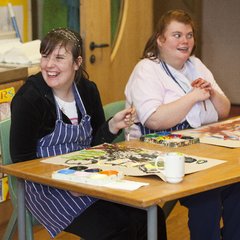 St. Michael’s House's Training Centres provide adults with the opportunity to engage in wide range of training, employment, social and recreational activities. The training programme encompasses all aspects of daily life which enables each individual to adapt socially, culturally and emotionally to independent living and employment. To meet these training objectives each individual has a person centred Individual plan, that outlines their personal goals and the supports required to achieve them.
St. Michael’s House's Training Centres provide adults with the opportunity to engage in wide range of training, employment, social and recreational activities. The training programme encompasses all aspects of daily life which enables each individual to adapt socially, culturally and emotionally to independent living and employment. To meet these training objectives each individual has a person centred Individual plan, that outlines their personal goals and the supports required to achieve them.
Quality and Qualifications Ireland: Our new approach
In 2010, St. Michael' s House embarked on an initiative to register as an accredited training provider with FETAC/QQI for people who use services.
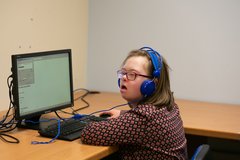 The organisation is committed to delivering quality educational opportunities to people who use services, and to supporting individuals to achieve accredited awards on the National Framework of Qualifications. Accredited training will afford service users increased opportunity for progression to further learning and employment. The implementation of QQI accredited training establishes a clear transfer and progression route for learners. The validated modules support the development of core learning and independence skills, which are crucial for individuals to progress to and actively engage in community education opportunities.
The organisation is committed to delivering quality educational opportunities to people who use services, and to supporting individuals to achieve accredited awards on the National Framework of Qualifications. Accredited training will afford service users increased opportunity for progression to further learning and employment. The implementation of QQI accredited training establishes a clear transfer and progression route for learners. The validated modules support the development of core learning and independence skills, which are crucial for individuals to progress to and actively engage in community education opportunities.
The QQI team recognised that in order to deliver high quality training it was critical that a structure of ongoing development of staff skills in the area of education and training be developed. To date, over 100 staff in day services have completed the ‘Train the Trainer’ module, which has been delivered in conjunction with the Open Training College (OTC) .
Staff are supported and mentored by the QQI Co-ordinators to ensure the delivery of quality educational experiences. Prior to the implementation of accredited training, many staff working in day services were supporting learners without the knowledge base or expertise to deliver training to best practice standards.
The ‘trainer’ group are encouraged to share skills and resources leading to a more efficient and effective use of course preparation and administration time. The provision of quality, accessible teaching materials is also an essential component in the delivery of training. Detailed records of teaching and learning have been developed and are now available in individual centres.
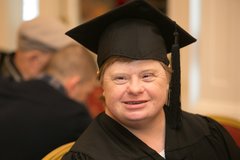 A comprehensive consultation process was undertaken with service users in relation to module selection, delivery methods, venues, learning materials and course information.
A comprehensive consultation process was undertaken with service users in relation to module selection, delivery methods, venues, learning materials and course information.
This consultation informed the development of modules. The Co-ordinators, frontline staff, Heads of units and clinicians were actively involved in the design and development of programmes, participating in Programme Design Teams. Over 50 staff members took part in these teams.
Over 400 learners have received minor awards .Learners participated in nine different modules:
- Healthy Eating
- Get Active Get Fit
- Know your Money
- Drama
- Listening and Speaking
- More than words
- My Choices
- My Safety
- Looking Good
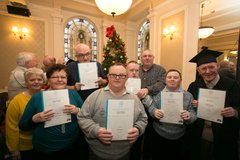 Learners may choose to complete the Major Award (6 Modules) or individual courses to gain a minor award. 16 individuals achieved a major award in General Learning at Level 2 of the National Framework of Qualifications. This is a very significant achievement for these learners, with each person completing 6 courses in order to get this award. A number of Graduation ceremonies have been held since the introduction of QQI, which learners attended with their families and friends
Learners may choose to complete the Major Award (6 Modules) or individual courses to gain a minor award. 16 individuals achieved a major award in General Learning at Level 2 of the National Framework of Qualifications. This is a very significant achievement for these learners, with each person completing 6 courses in order to get this award. A number of Graduation ceremonies have been held since the introduction of QQI, which learners attended with their families and friends
The accredited training forms part of what is required under the New Directions report and interim standards in day service delivery, these principles are embedded in the QQI Quality Assurance offered by St. Michael’s House. They include a focus on personal choice and goals, the promotion of community inclusion, outcome focussed services, best practice models, quality services with flexible supports that can be reviewed and evaluated.
The 12 key supports outlined in New Directions include supports for transfer and progression, supports for accessing education and formal learning, supports for accessing vocational training and employment. Delivering QQI accredited training ensures national standards in the provision of these supports to people using services.
Also in the HIQA standards the importance of identifying the educational, training and employment needs of people in residential services, and the provision of appropriate opportunities to engage in education and training (Standard 4.4) is highlighted .
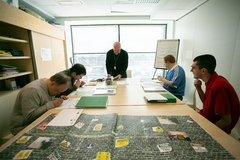 LearningCourses have been extended to a number of local centres across the organisation, and a pilot evening course was undertaken with a small number of residential houses on the north side of the city.
LearningCourses have been extended to a number of local centres across the organisation, and a pilot evening course was undertaken with a small number of residential houses on the north side of the city.
The coordinators continue to provide training to staff to enable them to deliver QQI programmes in their centres. The QQI accredited programmes have been extended to an increased number of centres, including the local centres.
The QQI Co-ordinators are in the process of evaluating the outcomes achieved for learners through the QQI programmes.
Learners have participated in a number of pieces of collaborative work with third level institutions such as UCD, DIT and NCAD. These initiatives allow us to explore ways for learners to transfer and progress to mainstream educational opportunities.
There has been an increase in the number of courses taking place in community locations.
The delivery of QQI awards provides an opportunity for an external evaluation of the modules undertaken and the work produced by learners. This is the first time the quality of training in St. Michael’s House day services has been evaluated and measured against national standards
Short Term Training Centre
Vocational training services are offered to young adults to support them in making the transition from school to the world of work, equipping them with the necessary life and social skills.
St. Michael’s House Short-Term Training Centre at Adare Green, Coolock provides young adults with a three-year transition programme delivered through a range of training modules;
- Independent Living Skills - for example home-making
- Personal Development - for example self-advocacy
- Community Skills - for example independent travel
- Leisure Activities
- Modern Technology - for example computer skills
- Work Experience
The Launch of the Public Sector Duty Easy to Read Guide
Ailis C who attends one of our Day Services recently received a train-the-trainer certificate presented by Human Rights and Equality Commission Chief Commissioner, Emily Logan. Ailis can now train peers in their rights in relation to public services. For more Information click here.
Some Adults who use our services telling their own story
Local Centres
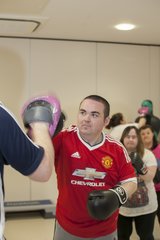 Local centre teams provide services during the day for groups of 10-12 adults with an intellectual disability some who also have physical disabilities. The term “Local Centre” originated as the centres were set up in the services users' local communities, The first Local Centre was established in 1986 in Mellowe's Road in Finglas. Whilst the demographic of services users has changed as service users have become older/moved into residential care, the buildings remain close to local amenities and tend to be in the heart of a local community. The ethos of local centres is to focus on participation in the local community whilst maintaining a base to provide care for individual personal needs and to develop life skills and learning for the people who use the service.
Local centre teams provide services during the day for groups of 10-12 adults with an intellectual disability some who also have physical disabilities. The term “Local Centre” originated as the centres were set up in the services users' local communities, The first Local Centre was established in 1986 in Mellowe's Road in Finglas. Whilst the demographic of services users has changed as service users have become older/moved into residential care, the buildings remain close to local amenities and tend to be in the heart of a local community. The ethos of local centres is to focus on participation in the local community whilst maintaining a base to provide care for individual personal needs and to develop life skills and learning for the people who use the service.
The vision of the Local Centre model is to expand opportunities for learning including the development of Cosán and to support service users to learn new life skills and develop independence
Examples of these include increased learning and control over personal finance, learning to travel on public transport, independent living skills and community activities .
The Cosan initiative supports the planning of activities and develop skills in line with New Directions. It allows for the development the area of assistive technology use for service users who require it in all local centre settings. The Local Centre teams are expanding QQI courses within the Local centres. Whilst still in its infancy (the first courses began in March 2017), we would envisage that within the next 5 years that 65-70 % of all service users within the local centres who express an interested will be facilitated to complete a QQI course.
HUBs
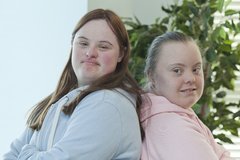 There are four hub services within SMH with one in Service Area 1 and three in Service Area 2. The hub services are very individualised for each service and are tailored to meet the specific needs of the service users that attend. The ultimate goal of all our Hub services is to develop and establish individual goals and wishes of our young adults and support them achieve these goals in their local community.
There are four hub services within SMH with one in Service Area 1 and three in Service Area 2. The hub services are very individualised for each service and are tailored to meet the specific needs of the service users that attend. The ultimate goal of all our Hub services is to develop and establish individual goals and wishes of our young adults and support them achieve these goals in their local community.
We empower the young adults to identify and source facilities/supports in their community and to be active members in their local community. The Hub services supports young adults from the age of 21-30 to identify, maintain and build on their skills, ultimately leading into education, employment and recreational activities within their communities.
Positive risk is an integral element in enhancing the quality of life of the young adults who avail of the Hub services.
We encourage and support Hub users to maintain and develop valued relationships, to make choices in relation to their health and well being and in accessing mainstream and specialist supports.
In all our Hub services, we encourage and support open honest communication where everyone can express themselves freely and are supported to be part of decisions about the running of their service but ultimately achieving their individual goals in their local community .
Abhainn Adult Autism Specific Disorder (ASD) Services
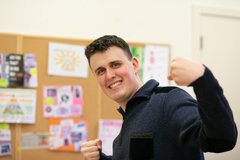 St. Michael' s House provides services for people with intellectual disability who also have a diagnosis of autism spectrum disorder.
St. Michael' s House provides services for people with intellectual disability who also have a diagnosis of autism spectrum disorder.
Abhainn Adult ASD delivers a day service to individuals with a learning disability and ASD. Currently there are four Adult ASD centres, two in Baldoyle, one in Swords and one in Finglas .
The mission statement for Abhainn services which was developed in consultation with attendees focuses on providing supports for adults with ASD and a learning Disability, in the areas of Education ,Vocational training, Employment and Recreational opportunities. The supports offered promote progression, dignity , choice , and community participation.
People with ASD/ID require supports from across a number of sectors i.e. mental health, social care, general health, housing and education. These supports are facilitated by the staff and clinic team of the service. It is critical that Clinical pathways for assessment and intervention are flexible and responsive to individual needs
Emphasis is on a family-focused approach that supports the person in the context of their natural network that can work around the family's routines and the person's particular requirements. Many families also require therapeutic supports to deal with the additional stress that can be involved in supporting an adult with complex needs due to ASD/ID.
The people attending Abhainn are offered support packages that are tailored and designed to meet the specific needs and preferences of the person, and linked with their own community.
The Abhainn team provide supports for adults outside Day service hours, this allows individuals to access activities at normal times similar to their peers, in their own communities .
New Directions
Like all agencies and organisations funded by the Health Service Executive (HSE) to provide day services to adults with disabilities, St. Michael’s House must provide those services in line with New Directions. There is currently no regulation of day services. However as an interim or short-term measure, the HSE has prepared a set of draft interim standards for day services.
New Directions sets out twelve supports that should be available to people with disabilities using 'day services'. It proposes that 'day services' should take the form of individualised outcome-focussed supports to allow adults using those services to live a life of their choosing in accordance with their own wishes, needs and aspirations.
The HSE published Interim Standards for New Directions Services and Supports for Adults with Disabilities Report requiring agencies like St. Michael's House to involve people with disabilities in the design, delivery, monitoring and evaluation of the services and supports provided.
The Interim Standards aim to be a catalyst for community inclusion and self-determination in the lives of people with disabilities.
Keeping with Theme 1 Individualised Services and Supports- St. Michael's House further developed Person-centredness which is a set of beliefs, attitudes and expectations about the right and capacity of a person with a disability to live their life in accordance with their aspirations, needs and abilities.
A person-centred approach to service provision is one where services are planned and delivered with the active involvement of people who use services.